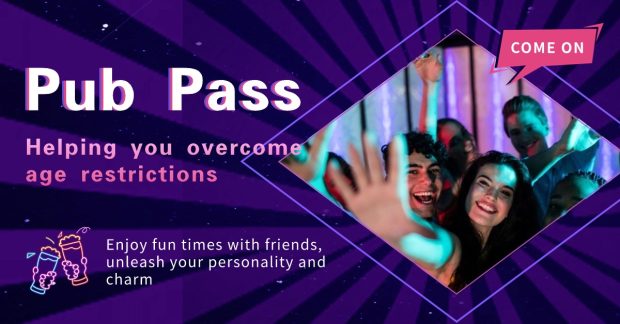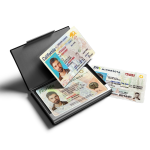What Are Novelty USA Drivers License Templates?
Novelty USA drivers license templates refer to digital or printable designs mimicking the layout of real U.S. driver licenses but labeled or structured to clarify they are not valid for official use. These templates often include placeholders for personal details like name, birthdate, and address, along with stylized elements such as state-specific emblems, mock holograms, or fake barcodes. They are typically sold online through marketplaces, creative platforms, or specialty websites catering to party planners, cosplayers, or hobbyists.
Unlike counterfeit IDs, which aim to deceive, novelty templates usually include visible disclaimers—such as “Prop Only,” “Not Valid for Identification,” or watermarked text—to distinguish them from government-issued licenses. However, the line between “novelty” and “fraudulent” can blur depending on design quality, the presence of security features, and how the final product is used.
The “Fun” Side: Creative Uses of Novelty License Templates
For many, novelty drivers license templates serve as tools for creativity and entertainment. Here are common scenarios where they add value:

Themed Parties and Events
Themed gatherings—like 1950s diners, Las Vegas nights, or “adult” birthday celebrations—often use fake licenses as party favors or icebreakers. Imagine a 21st birthday where guests receive a “21+ License” with playful details (e.g., “Favorite Drink: Sparkling Soda” or “Expiration Date: Forever”). These props spark laughter and fit the event’s tone without intending harm.
Cosplay and Costume Design
Comic cons, theater productions, or film projects frequently require characters to carry props that look authentic but aren’t real. A cosplayer dressed as a fictional detective might use a novelty license with a character’s name and fabricated details to enhance their persona. Similarly, historical reenactors could use period-appropriate license templates to maintain immersion.
Educational Projects
Teachers or parents may use novelty licenses in classroom activities or home lessons to teach ID verification basics. For example, a high school civics class could analyze security features on real vs. fake licenses, using templates to demonstrate how governments deter forgery.
Personal Mementos
Some people create novelty licenses as quirky keepsakes. A couple might design a “Marriage License” template with inside jokes, or a pet owner could make a “Pup License” for their dog with goofy stats like “Breed: Cuddly Troublemaker” or “Blood Type: Puppy Kisses.” These items hold sentimental value without any deceptive intent.
The “Risky” Side: Hidden Dangers of Novelty License Templates
While many use novelty templates responsibly, the potential for misuse or unintended consequences is significant. Here’s why caution is critical:
Legal Consequences
U.S. federal law (18 U.S. Code § 1028) prohibits the production, sale, or use of “false identification documents” with intent to defraud. Even if a template includes a disclaimer, if a modified license is used to gain access (e.g., entering a bar, renting a car), authorities may argue the user intended deception. Penalties can include fines up to $250,000, probation, or imprisonment for up to 15 years, depending on the offense’s severity.
State laws add further restrictions. For example, California Penal Code § 470 prohibits “forgery,” which includes altering documents to appear genuine. Even a “joke” license shown to a bouncer could lead to charges if the establishment presses issues.
Identity Theft Risks
Downloading templates from untrusted websites can expose users to malware or data theft. Some low-quality sellers embed malicious code in downloadable files, which can steal login credentials, banking info, or personal data. Additionally, if a template includes fields for real names, addresses, or photos, sharing the final product online (e.g., on social media) could put sensitive details in the wrong hands.
Misidentification by Authorities
High-quality templates may accidentally mimic real licenses’ security features (e.g., UV ink, microprinting). If a user carries such a prop in public and is stopped by law enforcement, officers may not immediately recognize it as fake. This could lead to temporary detention, background checks, or even arrest while authorities verify the license’s legitimacy.
Reputational Damage
Employers, schools, or social circles may view the use of fake IDs—even “just for fun”—as untrustworthy. A job candidate with a social media post showing a novelty license could face questions about integrity, while a student caught with one might face disciplinary action.
How to Use Novelty License Templates Safely
Enjoying the creative benefits of these templates while minimizing risk requires care. Here are actionable steps:
- Stick to Reputable Sellers: Purchase templates from verified platforms (e.g., Etsy, Creative Market) with positive reviews. Avoid sites offering “super realistic” or “undetectable” designs, as these may skirt legality.
- Add Clear Disclaimers: Even if the template includes a watermark, manually add bold text like “PROP – NOT FOR IDENTIFICATION” across the front. Use contrasting colors to ensure readability.
- Avoid Realistic Security Features: Skip elements like holograms, barcodes, or UV-reactive ink. These are hallmarks of genuine licenses and can confuse authorities.
- Keep Personal Info Fictional: Use fake names, birthdates, and addresses. Never include real driver’s license numbers, social security numbers, or government-issued IDs.
- Limit Public Use: Only display novelty licenses in private settings (e.g., home parties, closed cosplay groups). Avoid using them in bars, stores, or any location where ID might be checked.
Common Problems and Solutions
Even with precautions, users may encounter issues. Here are frequent challenges and how to resolve them:
Problem 1: “My novelty license was confiscated by a store clerk. What should I do?”
Solution: Remain calm and explain it’s a prop. Offer to show the template’s source or any disclaimers. If the clerk refuses to return it, ask for a receipt or written explanation. In most cases, stores discard or destroy such items, but documenting the incident can help if legal questions arise later.
Problem 2: “I downloaded a template, but it has fields for real SSNs. Is this dangerous?”
Solution: Delete the template immediately. Report the seller to the platform (e.g., Etsy, eBay) for violating guidelines. Avoid any template that requests sensitive data—legitimate novelty designs focus on fun details, not personal identifiers.
Problem 3: “A friend used my template to make a fake ID. Am I legally responsible?”
Solution: Liability depends on intent. If you shared the template without knowing it would be misused, you’re likely not liable. However, if you knew your friend planned to deceive (e.g., enter a bar), you could face charges as an accomplice. Keep templates private and clarify their purpose when sharing.
Problem 4: “How can I make a novelty license that’s clearly fake?”
Solution: Use exaggerated details like “Birthdate: January 1, 3000” or “License Number: FAKE-1234.” Add cartoon elements (e.g., a unicorn instead of a state seal) or neon colors not used on real licenses. Include a large, uneditable watermark stating “JOKE PROP.”
Problem 5: “Are there age restrictions for buying these templates?”
Solution: Many sellers require buyers to be 18+ to comply with platform rules. Check the product description for age limits, and respect them—purchasing as a minor could lead to account bans or parental issues. If a seller doesn’t specify, err on the side of caution and avoid buying.


